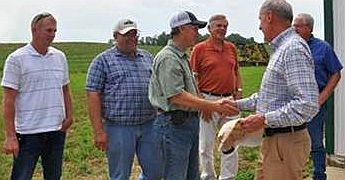 02/05/14 Senator Coats voted for the bipartisan farm bill agreement Tuesday afternoon. The legislation passed the Senate 68 to 32, after previously passing the House 251 to 166 on January 29. It will now to go President Obama’s desk to be signed into law.
02/05/14 Senator Coats voted for the bipartisan farm bill agreement Tuesday afternoon. The legislation passed the Senate 68 to 32, after previously passing the House 251 to 166 on January 29. It will now to go President Obama’s desk to be signed into law.
Coats heard about this issue multiple times during his recent statewide Indiana Way tour, and he said that providing Hoosier farmers with certainty was a major reason he supported the bill.
“It has been nearly six years since Congress last authorized a farm bill, and Indiana’s agriculture community has waited long enough,” said Coats. “While not perfect, this legislation provides Hoosier farmers with the certainty they need for the next five years.”
The senator’s full statement on the farm bill is available here.
Senator Joe Donnelly today noted the many Hoosier priorities included in the final bipartisan, five-year farm bill. The bill passed the Senate with a vote of 68 to 32 and now heads to President Obama for his signature.
“The Hoosier ag community now has the certainty it deserves,” said Donnelly. “There are a number of provisions in this bill important to Indiana, and I look forward to continuing to work with our state’s farmers and rural communities. I am proud of the work our farmers do to feed their fellow Hoosiers and the world—as well as produce homegrown energy to lessen our dependence on foreign oil.”
Donnelly advocated for a number of provisions important to Hoosiers during the farm bill debate. Several are in the final bill, including:
· Expanding crop insurance coverage for crops grown for feedstocks to produce biofuels, electricity, or biobased products;
· Improving the process of setting conservation technical assistance funding levels by giving USDA the authority to set the levels, not OMB;
· Establishing a pilot program to allow canned or frozen fruits and vegetables to participate in school snack programs;
· Protecting full planting flexibility by eliminating any permanent base reduction for planting fruits or vegetables; and
· Prohibiting the EPA from requiring Clean Water Act permits for storm water runoff associated with timber harvesting, nursery operations, pest control, reforestation and logging road use, construction and maintenance.
Read more about Donnelly’s efforts on the farm bill and other agricultural issues here.














